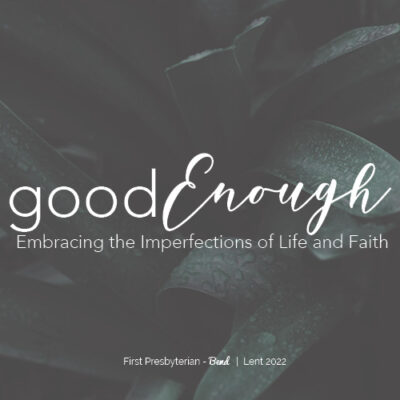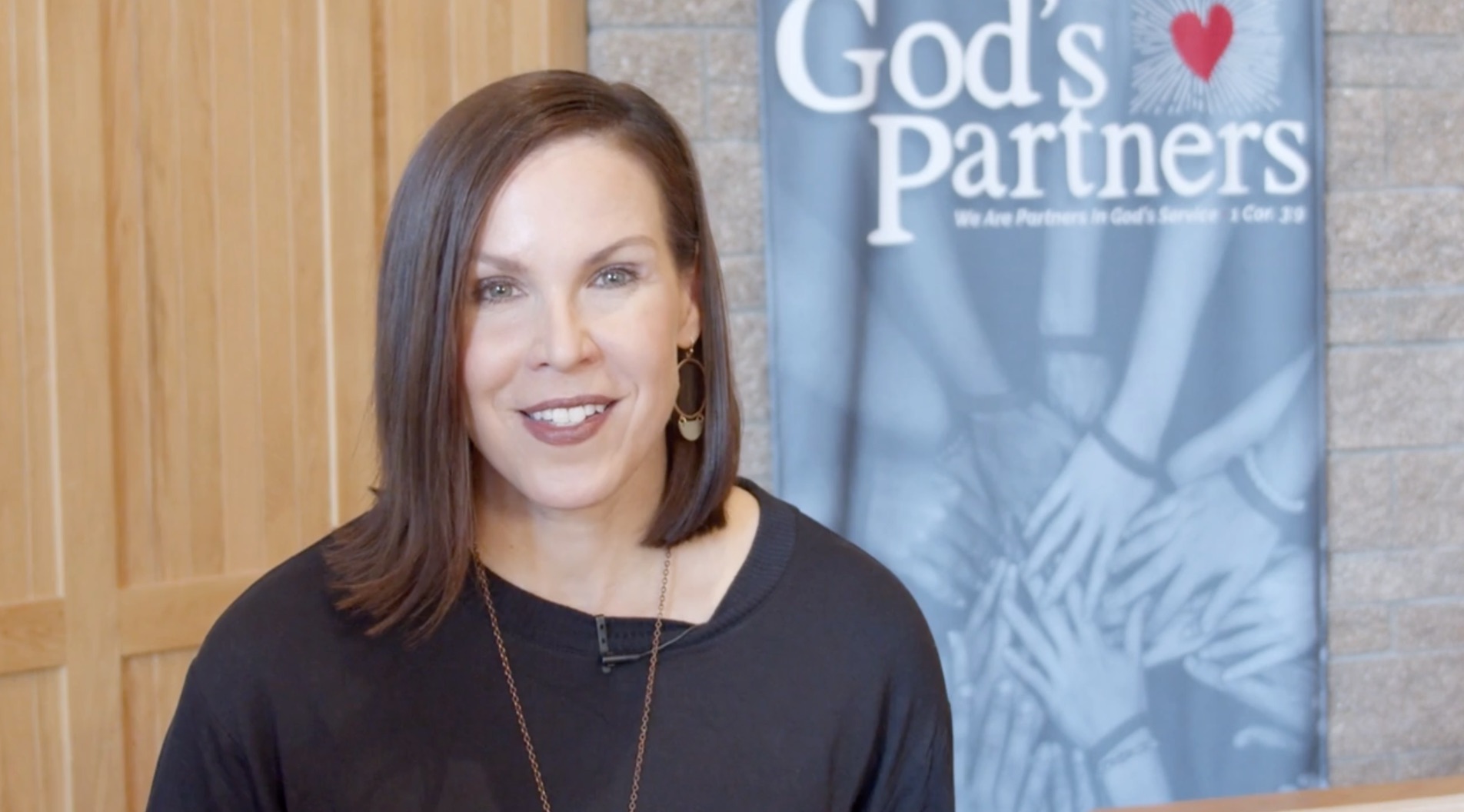Mar 6th, Ordinary Lives Can Be Holy, with Rev. Kally Elliott
A Part of the Series:
Rev. Kally Elliott
Other Articles in:
Mar 6th: Ordinary Lives Can Be Holy, with Rev. Kally Elliott.
Jesus, full of the Holy Spirit, returned from the Jordan and was led by the Spirit into the wilderness, where for 40 days he was tempted by the devil. He ate nothing at all during those days, and when they were over, he was famished. The devil said to him, if you are the Son of God, command this stone to become a loaf of bread. Jesus answered him, It is written, One does not live by bread alone. Then the devil led him up and showed him in an instant all the kingdoms of the world.
And the devil said to him, to you, I will give their glory and all this authority, for it has been given over to me, and I give it to anyone I please. If you then will worship me, it will all be yours. Jesus answered him, it is written, Worship the Lord your God and serve only him. Then the devil took him to Jerusalem and placed him on the pinnacle of the temple, saying to him, if you are the Son of God, throw yourself down from here. For it is written, he will command his Angels concerning you to protect you, and on their hands they will bear you up so that you will not dash your foot against a stone.
Jesus answered him. It is said, do not put the Lord your God to the test. When the devil had finished every test, he departed from him until an opportune time.
On the evening of Wednesday, February 23, my son and I sat on the couch scrolling through the news, stunned and heartbroken that Putin had declared war on Ukraine. I asked my son if he was worried, and he said, yeah, I mean, I’m only 14, I have a whole life to live, and I’m only four years from military age. Yeah, I’m worried. So am I, I replied.
In the morning, I awoke and quickly checked the headlines. Images of families fleeing the Ukrainian capital, of bombs exploding in the distance filled my feed. My sister in-law called, asking me to pray for her friend Anya, who was trying to escape the Ukrainian city with her two young daughters, and once again my heart broke. I went through the motions of an ordinary morning, making coffee, cooking breakfast, reminding my husband of our evening plans. I had a busy day ahead of me and I had to write a sermon.
This sermon according to our plan for Lent. It was supposed to be how an ordinary life can be Holy, and I’ve done all the prep in the last few days. I was ready to write. But the news, the war, Anya and her two daughters, all the children in Ukraine, all the mothers and fathers, my own son, or rather sons and daughter, as they are all nearing their teenage years. And a mother can’t help but worry when she hears the word war.
How was I to write on ordinary life when nothing about this morning felt ordinary, panicked thoughts of self preservation began taking over. Anything rational. I could build a bunker, but where? My backyard isn’t very big, and that seems like a lot of work. And let’s be honest, me build a bunker.
Okay. We could move somewhere off grid where a world war couldn’t find us. Except if it’s a world war, this planet doesn’t offer much reprieve. I could call my doctor and get the dose of my anxiety meds increased by, like, several doses. But none of those things would actually quell the deep sense of fear, anxiety, and grief.
Oh, the grief. Sitting like an elephant on my chest while increasing my anxiety meds might help, but those take a while to kick in. And life, I mean ordinary life. It has to continue. I have to go pick up my daughter from school.
I have to make dinner. I have to host Zoom meetings, fold the laundry, take the dog for a walk, and write this sermon. What a strange place to find myself.
But, you know, it’s not so strange to those who live with a chronic disease whose cancer has returned, those who never know when the pain will increase or when mental illness will once again wreak havoc on their minds and lives, or for those who live with the threat of violence on a daily basis, those who are hungry and can’t feed their children, those for whom fear is woven into the fabric of ordinary life.
So how do they go on? How do we go on? How do we live a life that is not a slave to fear, a life that recognizes the fragility of it all but grips tightly to hope.
In her book Bird by Bird, Anne Lamont shares the story of her best friend Pammy, who at the age of 37 was dying of cancer. Calling Pammy’s doctor in the middle of the night, grief stricken at the thought of losing her best friend, Anne was hoping to hear a positive slant on some distressing developments. Instead, the doctor told Anne, Watch Pammy carefully right now because she is teaching you how to live. Anne writes, I remind myself of this when I can’t get any work done to live as if I am dying because we are all terminal on this bus. So I say to myself, okay, let’s see.
Dying tomorrow. What should I do today?
Well, Anne, when you put it that way, well, I’d be suffocating my kids with hugs. I’d be passionately kissing my husband assuring. My mother, she did everything right, telling my father how much I appreciate him despite his politics, gushing over everyone, smothering them with my love, making sure they knew in their deepest places how dearly I love them. That’s what I would be doing if I knew I was dying tomorrow. This is why observing the season of Lent, or what author Kate Bowler refers to as the saddest season of the year, can be such a meaningful practice in Lent, we practice remembering two unpleasant truths about life the fact that our relationship with God and others is in need of healing, and that in and Lamont’s language.
Everyone on this bus is terminal. It’s a day that we smudge Ashes on our foreheads in the shape of the cross, looking each other in the eye and saying, Remember, you are dust, and to dust you shall return to soften the blow. And because it’s the truth, I always add, but you are beloved dust. It’s still sobering language. And yet on most days, especially days when I would rather be distracted or numb to the life that is right before me, it is a powerful and much needed reminder.
I won’t live on this Earth forever, and neither will the people. I can’t live without those so incredibly dear to me. So how should I live today? A day that maybe feels ordinary or maybe feels scary, a day I’ve been given to be alive?
Traditionally, on this first Sunday of Lent, the story of Jesus in the wilderness being tempted by Satan is read and retold. The story picks up just after Jesus has emerged from the Jordan River, newly baptized, the beloved Son of God, a young man of about 30, excited about his vocation, ready to get to work, when, in a surprising plot twist, the Spirit of God leads him not to the sick or the hungry or the lonely, but instead into the wilderness. It’s a frightening place. Lonely, dry, arid, windy, a peace where a man could panic, break down, go mad there for 40 days and 40 cold and dark nights. He has no food, no friendly companion, nothing to distract him from the stark reality right in front of him, or from the thoughts and fears swirling inside his head.
The story continues with Jesus being tested three times by Satan. Now, I’ll admit, I don’t believe in a man in a little red suit, unless you count Santa Claus. I wonder if instead, the Satan character is a symbol for that voice inside our heads, telling us we aren’t enough. We could be more. We could be great.
We could be loved. If only, if only we weren’t so lazy or overweight or selfish. The list could go on. I wonder if the Satan character is the voice of shame, the voice of if only the voice that tries so hard to separate us from our true identity. Beloved child of God, you could be so much more loved, valued, worthy.
If only, if only.
Well, if so, we can be assured that Jesus knows that voice, too. If you really were loved by God, Jesus, you wouldn’t be hungry or struggling or sick or in pain. If you were loved by God, you’d have everything you need, maybe everything you want. Feed yourself, then turn this stone into bread. If you weren’t such a phony, an imposter, people would respect you more.
In fact, you could be in charge. If you just listened to my voice, paid attention to me, you could really be something. All you need to do is prove yourself, establish a little credibility, jump from the temple. No harm will come. If God loves you, God will protect you.
At his baptism, Jesus heard the absolute truth about who he was beloved in the wilderness. He had to face down every vicious assault on that truth, learning how to be God’s beloved even as he faced his own limits. No, he tells Satan, quoting Torah, one does not live by bread alone. Worship the Lord your God and serve only him. Do not put the Lord your God to the test.
At the end of those 40 days in the wilderness, Jesus learned the limits beyond which he must not and cannot go. If he was to be faithful to God and to himself, it must have been difficult. And his trial was not completely over. As the devil left him until an opportune time, the text says, oh, he would hear that voice again. But I wonder about that final limit.
He must have learned the limit that comes with starving to death in the wilderness, the limit on his human life. It was a lesson he had to learn. He did not have forever. His human life was terminal like any of us. He didn’t know how long he had here on Earth, but he knew one thing for sure.
He knew he would die at some point. And as it turned out, it was only three years away. But by learning about it, he also learned that crucial lesson, that life, his life was precious, that every day mattered, that every word spoken, every gesture, every relationship was sacred and Holy and irretrievable. He learned about his own mortality at the age of 30. I heard a news report that the Ukrainian government is drafting all reservists ages 18 to 60 to fight for their country.
18 is a young Age to learn about your own mortality. A Ukrainian mother interviewed for the BBC the morning after the first attacks said, I dressed my ten year old son. We had some breakfast sitting as far from the windows as we could, but he was so scared he vomited.
Ten is an even younger Age to Learn about Your Own Mortality or the Mortality of your mother.
Some of us today might find ourselves in a similar but different situation, but still faced with our own mortality and wondering how to live this day. How then shall we live? How did Jesus live upon learning he too would someday die? We don’t have a daily account. We don’t know very much, actually, about how he lived each day.
We know about a few days. We know some of the things he did and said. But what is written down about his life leads me to believe that Jesus lived most, if not every day, every minute with Holy intentionality. Because learning about your mortality will do that to a person in the wilderness. Jesus learned that there were limits and that one day his life would end.
But he also learned something else. While Satan quoted Psalm 91, he will command his Angels concerning you to protect you on their hands. They will bear you up so that you will not dash your foot against a stone. Out there in that stark wilderness landscape with the sun beating down on him, Jesus must have learned that those words of his faith did not pleasantly guarantee his physical safety, that God does not protect him or us from suffering or illness or tragedy or even death. And Jesus would have known the rest of that Psalm.
He would have the words that followed committed to his memory. God will deliver you from the snare of the Fowler. The Psalm says, under God’s wings, you will find refuge because you have made the Lord your refuge. No evil shall befall you. And yet during his life, Jesus learned evil certainly would befall him.
That in fact, he’d be subject to plenty of it in his own life. In just three short years, he’d come to the end of his road on a Roman cross. And as he took his last breaths, he’d wonder if he’d been abandoned by his God. My God, my God, why have you forsaken me?
But then ultimately, he’d give himself over to the God who even in death, never abandoned him but held him close. Father, into your hands, I commit my spirit.
Shortly after the unprovoked Russian attacks began, the President of Ukraine made a speech saying his country had been abandoned to fight alone. Who is ready to fight alongside us? He cried, I don’t see anyone.
I watched the speech, my heart breaking, wanting to cry out, I will. I will fight with you. But the reality is I’m miles away from Ukraine and utterly terrified of war. So instead I cry out, My God, my God, have you forsaken them? Help Ukraine.
Remember, these are your beloved children. And my words seem so trite, so not enough, just more thoughts and prayers that will go unanswered. I don’t know what else to do right now on this ordinary day, so far away from the fighting. And so I turn again and again to prayer, this time a prayer written by Kate Bowler. God, the unthinkable has happened swiftly, relentlessly, by stealth and through open destruction, the peace and beauty of the ordinary has been shattered in a day.
O God of justice and might we call to you to come and bring the suffering to an end. Comfort these trembling hearts, shield the vulnerable, strengthen those with the resources and the resolve in the face of such overwhelming force. Grant wisdom to the nations of our world, to the leaders and to us to grasp the unfathomable, to see evil in its true light and come against it unflinchingly. Dear Ukraine, though we shudder to watch what is happening. We will not look away.
Friends on this day that we have been given, we will not look away. But we will use this day to live and to care and to grieve and to hopefully and however we can hold the people of Ukraine to God. Amen.



